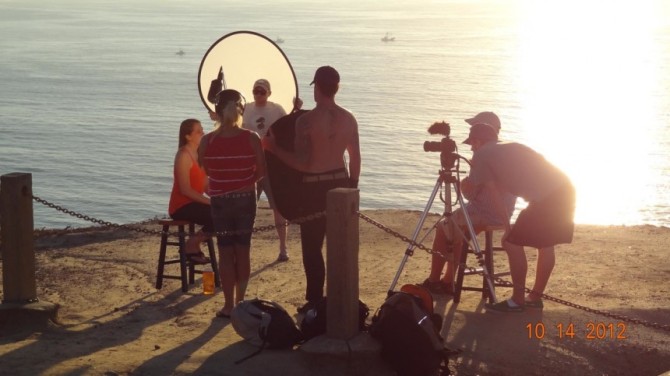
On-site, behind the scenes shot of filming Out In The Lineup at Blacks Beach in San Diego. Photo: Out In The Lineup
Each surfer profiled in the film has a unique, relatable narrative that inspires compassion and acceptance, but the idea that surfing’s hetero-normative affinity exceeds that of any other sport seems overwrought. Sports, more generally, have been slow to join the conversation, and organizations like Athlete Ally, that aim to eradicate homophobia in sports by empowering athletes and allies to champion gay rights, are changing that.
“Sports is the last closet,” Cyd Zeigler Jr., co-founder of the website Outsports, a website that reports on gay athletes and homosexuality in sports, told NBC. “Nobody’s out, but sports aren’t necessarily this horrible homophobic institution anymore. It’s just not.”
Things are getting better. Which is a function of the massive pendulum swing in culture (at least American culture) that’s taken place in the last five years.
While watching the film, I marveled at how much has changed culturally since Thomas and I exchanged those emails in 2010. Since that time, gay marriage has become legal in 19 American states, and our President declared the ban on gay marriage unconstitutional. The US Military ended “Don’t Ask, Don’t Tell.” Influential athletes like Jason Collins have come out in major sports leagues like the NBA, and productive public discussions around homophobia took center stage at the Sochi Olympics and the Super Bowl, arguably the two largest sporting events on earth, excluding the World Cup – which, instead championed the battle against racism, a parallel initiative around cultural sensitivities and openness. An intense, short interval of time has enabled radical changes in public attitude, which, ultimately, made this film feel exceptionally less relevant today than it might have been were it released three years ago. Ironically, that’s a good thing.
That said, the film seeks comment from the Association of Surfing Professionals, but, in a terrible misstep, the organization inexplicably retracts their on-camera interview, which leaves the ASP and professional surfing at a serious exposure. By contrast, the International Surfing Association’s Fernando Aguerre makes it clear that the ISA welcomes all surfers, from all walks of life.
I reached out to the ASP to understand why they abstained from commenting. They responded by referring me to their rule book, which clearly communicates a zero tolerance policy “for any form of discrimination, sexual harassment or abuse” as well as penalties that range from monetary fines to permanent expulsion from the Tour. They also shared the following statement:
“The ASP draws its inspiration from the ocean – an arena that does not distinguish where you’re from, the color of your skin, where you worship or your sexual orientation. As such, we are an organization of tolerance, objectivity and inclusiveness.”
Given the ASP’s unflinching written stance on the topic, it’s a shame the organization chose not to participate in the documentary – conceivably the only documentary to focus exclusively on homosexuality in surfing that will ever exist. A “no comment” certainly created unnecessary doubts about the ASP’s attitude towards issues of sexuality in surfing.

